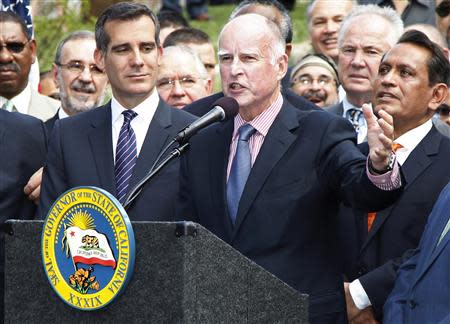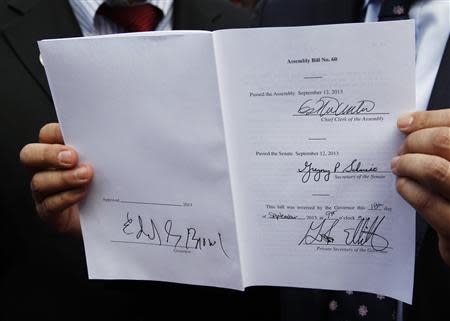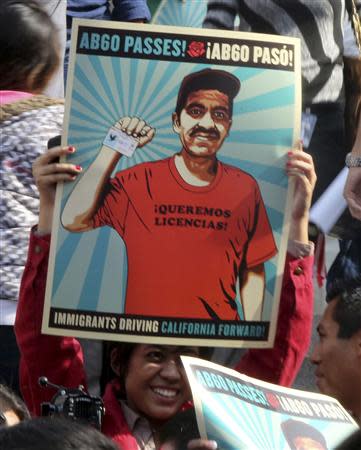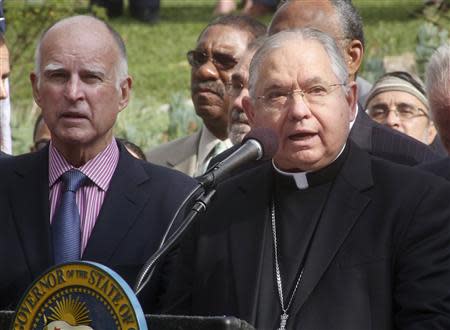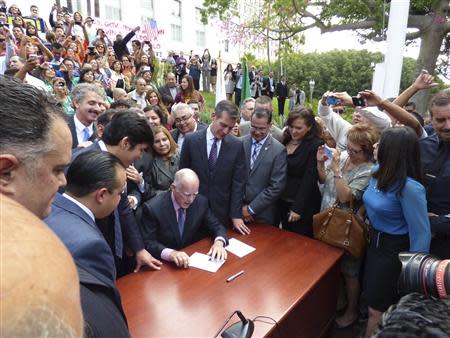Illegal immigrants can get driver's licenses under new California law
By Sharon Bernstein SACRAMENTO (Reuters) - Illegal immigrants living in California will be eligible to apply for driver's licenses under a law signed on Thursday by Democratic Governor Jerry Brown, in the latest action to expand privileges for such immigrants in the most populous U.S. state. The legislation marks a major victory for Latino and other immigration rights activists, who have fought for decades for such a law. The state says it is expected to spur 1.4 million people to apply for licenses over three years. The law, passed with substantial Republican support, marks a significant departure from past policy in California, which will join at least nine other states that allow undocumented immigrants to drive legally when the law takes effect in 2015. "Millions of immigrant families have been looking forward to this day," said Democratic Assemblyman Luis Alejo, who sponsored the bill. "It will allow them to go to work, go to school, take their kids to a doctor's appointment without fear that they are going to have their car taken away from them, or worse, be put into immigration proceedings." The law is part of a broader effort to expand immigrant rights in strongly Democratic California, where 2.6 million people - most of them Latino - lack legal status, according to a recent study by the University of Southern California. About 38 percent of California's population of 38 million is of Hispanic descent, state figures show, representing a potentially enormous number of voters with an interest in immigrant issues. The move by California stands in stark contrast to policy in states like neighboring Arizona, long at odds with Washington over immigration reform. Earlier this month, Arizona widened its ban on licenses for illegal immigrants, including those granted temporary relief from deportation. California, where two decades ago voters sought to bar illegal immigrants from public services including education, now allows college students brought to the United States as children to pay in-state tuition at California public universities to help defray the costs of higher education. Bills awaiting the governor's signature would allow non-citizens to serve on juries, let undocumented immigrants practice law, and make it illegal for employers to retaliate against workers by threatening to report them to immigration authorities. ALREADY STUDYING FOR EXAM The law has particular meaning for immigrants such as 37-year-old Sugey Hernandez, who has already begun studying for her driving test, even though licenses aren't expected to be available to undocumented immigrants for over a year. She currently drives without a license to buy food and other necessities for her family. But she said the experience is terrifying, because she is always afraid of being pulled over. "Sometimes we are just so afraid of the police," said Hernandez, who is originally from Mexico but lives in the Los Angeles suburb of Maywood. "I don't go out on holidays because the police are going to be outside. ... You feel like you are in a prison sometimes." The new law, which passed on votes of 28-8 in the Senate and 55-19 in the Assembly, sent a defiant message to Congress about its failure so far to pass comprehensive immigration reform despite considerable momentum on the issue earlier this year. "When Congress fails to act, it forces states like California, with (the) largest immigrant population in country, to enact laws to improve the lives of immigrants," Alejo said. Brown had initially threatened to veto the driver license bill but changed his stance after advocates promised it would not conflict with federal law. "No longer are undocumented people in the shadows," Brown said at a signing ceremony in Los Angeles. "They are alive and well and respected in the state of California." REPUBLICAN SUPPORT The bill won support from nearly half of the California legislature's Republicans, who broke ranks with their national leaders to support a number of protections for illegal immigrants at the state level and urged Congress to act. On Thursday, a Republican Assembly leader who had not been part of that group criticized the bill as part of a "piecemeal" rather than comprehensive approach to immigration reform. But he also urged Congress to act. "As Americans, we need to find compassionate, caring solutions to this immigration challenge," said San Diego County Assemblyman Brian Jones. "The first challenge is to secure our borders. The second challenge is to find a way for people to have legal status." A conservative Republican assemblywoman, Diane Harkey of Orange County, said earlier that the measure could lead to racial profiling, because the licenses would be different from those issued to legal residents. To conform with federal law, the licenses must show that the bearers have not presented a birth certificate or Social Security card. The state Department of Motor Vehicles said Thursday it would begin to develop regulations required by the new law, which will go into effect January 1, 2015, unless the state determines it can begin issuing the licenses sooner. Alejo said he would prefer the California licenses be discreet, with small wording on the back indicating the license was not meant for identification purposes. The law bars discriminating against people with the special licenses. (Reporting by Sharon Bernstein; Editing by Cynthia Johnston, Steve Orlofsky and Ken Wills)
